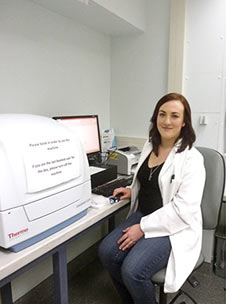
Emma Spencer
Emma Spencer's search for the perfect place for postgraduate biomedical study led her straight to Otago's door – after all, it held all the cards: reputation, intriguing projects, opportunities to help others and a campus in her home town of Christchurch.
Now, heading into her second year of PhD study at the Centre for Free Radical Research (CFRR), in the Department of Pathology, Emma recalls her path to Otago.
“I did my Bachelor of Science in Biochemistry at the University of Canterbury,” she says. “I really enjoyed the medical biochemistry and toxicology papers. I knew I wanted to move into research in the medical field at a University with a great international reputation. I was keen to stay in Christchurch, too. A friend mentioned the Bachelor of Biomedical Sciences with Honours (BBiomedSc(Hons)) course at the University of Otago, Christchurch, to me and I haven't looked back!"
Emma says her PhD project is an extension of her BBiomedSc(Hons) work.
“My thesis is entitled “Exploring the anti-cancer and anti-inflammatory properties of novel isothiocyanates. The subject area interested me because it allows me to apply my skills to an area of science which has the potential to improve the health and wellbeing of others.
Isothiocyanates are a class of naturally-occurring chemicals that come from plants such as broccoli, watercress and wasabi. They exhibit anti-cancer and anti-inflammatory activity in different models, but their mechanism of action is unclear. My primary goal is to investigate the activity of different isothiocyanates and identify lead compounds for the development of new therapeutic agents.
Initially, I will measure the ability of isothiocyanates to inhibit a protein called MIF (macrophage migration inhibitory factor), which promotes inflammation and is linked to conditions such as arthritis, inflammatory bowel disease and heart disease.
Through collaboration with researchers on the Dunedin campus we know exactly where on MIF the isothiocyanates bind and inhibit the protein, and our colleagues in the Department of Chemistry have made a range of novel compounds that will hopefully have improved inhibitory capacity. It is very exciting working with compounds that have never been used before.”
Emma describes her head supervisor Associate Professor Mark Hampton and co-supervisor Professor Tony Kettle in glowing terms, saying they and the Department of Pathology in general have been wonderfully supportive and approachable.
Her key postgraduate highlights include spending two weeks working within the Dunedin campuses Department of Biochemistry.
“It was fantastic to meet and work with other collaborators on the MIF project. I also thoroughly enjoyed meeting other researchers with common interests at the University's Oxygen Theme Meeting last year, and presenting my findings to a wide variety of audiences.”
Once her PhD is complete, Emma is keen to continue working in university-based biomedical research overseas.
“My biggest interest outside of university is travelling. I think that comes from having such an inquisitive nature (and that is so beneficial to science!).”
An e-newsletter for people interested or involved in postgraduate study at the University of Otago
Archive
Subscribe
The Otago Post is distributed via email three times a year.
Subscribe to the Otago Post.
